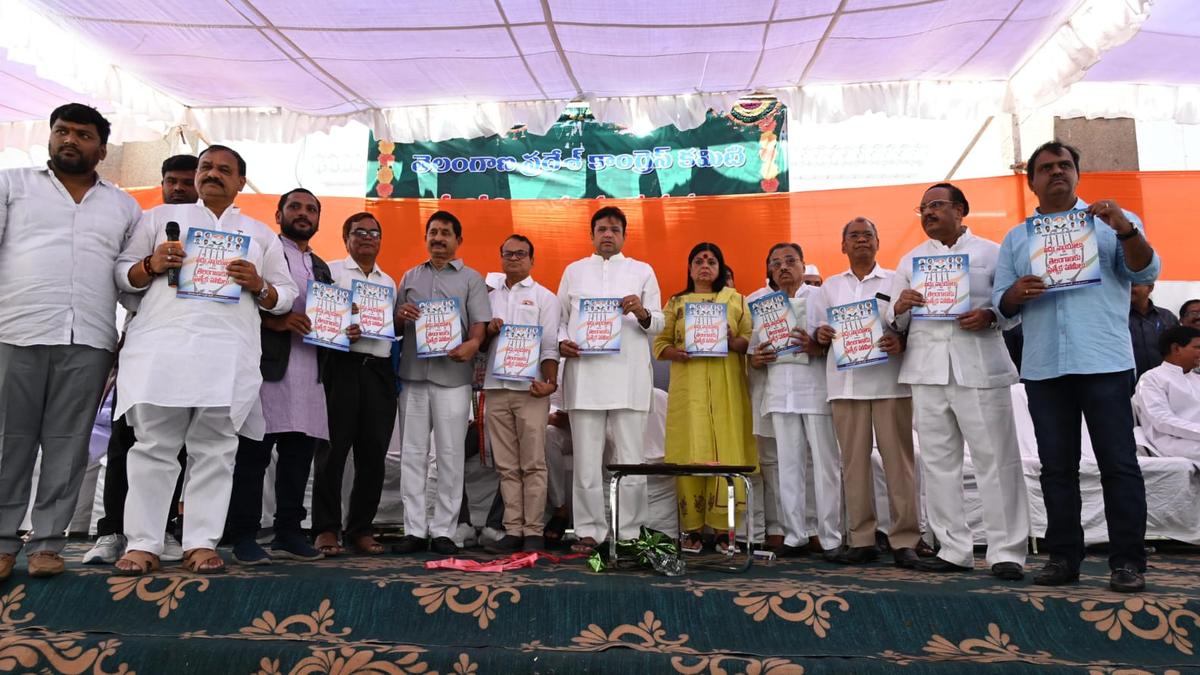
Congress releases Telangana-specific manifesto for Lok Sabha polls
The Hindu
Congress party's Telangana-specific manifesto promises ITIR revival, a bench of Supreme Court in Hyderabad, and various development projects.
Revival of the Information Technology and Investment Region (ITIR) project in Hyderabad, remerging five Andhra Pradesh villages into Telangana and a bench of the Supreme Court in Hyderabad are the major promises of the Congress party that released a Telangana-specific manifesto in Hyderabad on Friday.
IT Minister D Sridhar Babu, who is also the Chairman of the Manifesto Committee released the manifesto along with All India Congress Committee (AICC) in-charge for Telangana Deepa Das Munsi, Advisor to State government Vem Narender Reddy.
He said the five villages of the Bhadrachalam mandal, transferred to AP after the State reorganisation in 2014, would be transferred back for the speedy development of the temple town of Bhadrachalam.
He said these promises would be fulfilled once the Congress comes back to power in Telangana. Residents of the villages Yetapaka, Gundala, Purushottam Patnam, Kannegudam and Pichukalapadu on the AP border have been opposing their merger with the Andhra Pradesh since 2014.
The Bharatiya Janata Party (BJP)-led National Democratic Alliance (NDA) government transferred these villages to AP so that the Polavaram project could be taken up without much opposition. The villages are part of the seven mandals transferred to AP and made part of the East Godavari district. However, these villages are now in the Alluri Sitarama Raju district in AP.
The ITIR project was sanctioned by the Manmohan Singh government for Hyderabad as a part of the State bifurcation with the aim to create an IT corridor to create employment to lakhs of youngsters. It also argued that it would change the face of Telangana given the huge investments that would brought in.
The party also promised to take up the Rapid Rail transit system running parallel to the Hyderabad-Vijayawada highway as assured in the AP Reorganisation Act 2014.

“Writing, in general, is a very solitary process,” says Yauvanika Chopra, Associate Director at The New India Foundation (NIF), which, earlier this year, announced the 12th edition of its NIF Book Fellowships for research and scholarship about Indian history after Independence. While authors, in general, are built for it, it can still get very lonely, says Chopra, pointing out that the fellowship’s community support is as valuable as the monetary benefits it offers. “There is a solid community of NIF fellows, trustees, language experts, jury members, all of whom are incredibly competent,” she says. “They really help make authors feel supported from manuscript to publication, so you never feel like you’re struggling through isolation.”

Several principals of government and private schools in Delhi on Tuesday said the Directorate of Education (DoE) circular from a day earlier, directing schools to conduct classes in ‘hybrid’ mode, had caused confusion regarding day-to-day operations as they did not know how many students would return to school from Wednesday and how would teachers instruct in two modes — online and in person — at once. The DoE circular on Monday had also stated that the option to “exercise online mode of education, wherever available, shall vest with the students and their guardians”. Several schoolteachers also expressed confusion regarding the DoE order. A government schoolteacher said he was unsure of how to cope with the resumption of physical classes, given that the order directing government offices to ensure that 50% of the employees work from home is still in place. On Monday, the Commission for Air Quality Management in the National Capital Region and Adjoining Areas (CAQM) had, on the orders of the Supreme Court, directed schools in Delhi-NCR to shift classes to the hybrid mode, following which the DoE had issued the circular. The court had urged the Centre’s pollution watchdog to consider restarting physical classes due to many students missing out on the mid-day meals and lacking the necessary means to attend classes online. The CAQM had, on November 20, asked schools in Delhi-NCR to shift to the online mode of teaching.









